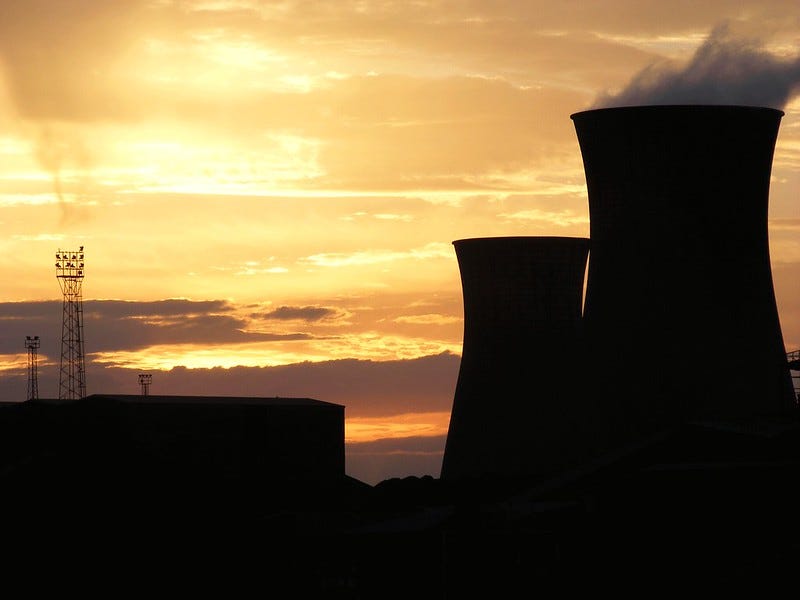Green steel revolution? ‘Now’s the time for action’
Why green, sustainable steelmaking could provide a lifeline for Scunthorpe
With tariffs, tariffs everywhere this week, we’re taking a look at the challenge for the steel industry and the potential future of green steel. In this special report for The Northern Eco, Paul Drury-Bradey from the Local Storytelling Exchange considers the current situation.

The proud industrial heritage of Scunthorpe, and indeed the United Kingdom, is teetering on a knife edge with the news of the possible closure of Scunthorpe’s steelworks.
British Steel, which is owned by China’s Jingye, has started consultations with its workforce and unions on redundancies stemming from the planned closures alongside a reduction of steel rolling-mill capacity, putting up to 2,700 jobs at risk.
This would be a true catastrophe for North Lincolnshire and it could have damning impacts on the UK’s national security - leaving the nation the only one in the G7 without the ability to make its own steel.
But union leaders – as well as scientists and local people – feel there’s still a chance that a pivot towards greener steel, coupled with the right investment, could place Scunthorpe back on the front foot.
Alasdair McDiarmid is Assistant General Secretary of the Community Trade Union, which represents many steelworkers. He said: “We are at a pivotal crossroads. Ministers must urgently determine how the £2.5 billion steel fund can be deployed swiftly to save British steelmaking and thousands of jobs.
“As the unions have demonstrated, there is a credible alternative plan to decarbonise British Steel and crucially the blast furnaces must operate through the transition, which is viable if the Government provides relief from £200m of carbon costs.
“This would represent a relatively small investment given the context and what is at stake and would be consistent with the actions of other European countries in supporting the costs of the green steel transition.”
Pioneering cleaner steel
Just last year steelworkers in Scunthorpe were part of a pioneering project to capture carbon emissions from the site, as part of an attempt to transform the manufacture of steel into a cleaner, greener and more sustainable business.
A mobile carbon capture pilot plant was set up at British Steel's Central Power Station in Scunthorpe. The successful experiment saw it extracting carbon from the power station's boiler flue which will then be used to create synthetic transport fuels.
Researchers believed the technology could be scaled up and play an important role in carbon capture, utilisation and storage across the world. This wouldn’t be the first time Scunthorpe steelmaking has been a global pioneer.
The town has a famous and storied history of steelmaking with the iron and steel industry being established in the mid-19th century. Entrepreneurs eventually formed three big companies that were consolidated into the nationalised British Steel Corporation in 1967. Scunthorpe steel has been used around the world and is renowned for its high quality.
Today, the steel could be part of a shift towards cleaner and greener industries and be used to build things like shafts for wind turbines or electric cars. And plans have been suggested to move to an electric arc furnace, which dramatically reduces carbon emissions.
A greener supply chain
Dr Marco Sakai, Associate Professor in the Department of Environment and Geography at the University of York, explained that electric furnaces could significantly reduce carbon emissions in Scunthorpe. With the UK’s share of energy from renewables standing at approximately 45%, it would mean the site could become a leader in lower-carbon steel production. But it is a complex process that requires joined-up working.
Dr Sakai said: “The green transformation of the UK steel industry cannot take place solely within the sector. The involvement of suppliers is vital, given that more than one-third of the world's steel production originates from scrap. Ensuring access to scrap dealers is thus important. Moreover, producing steel from scrap rather than from raw materials.”
The Government has already been working on a larger steel strategy which will aligns energy security and net-zero targets, Dr Sakai explained. The consultation runs along another study on building the North Sea’s energy future which could be vital for Scunthorpe with its location close to the sustainable and energy-rich coastal region.
Dr Sakai added: “A transformed Scunthorpe could play an important role in revitalising the North of England. Investment in the sector would create specialised jobs in areas such as engineering, technology, and renewables. But it could also to generate more general jobs along the supply chain.”
Building on Scunthorpe pride
Community leaders agree that Scunthorpe’s blend of industrial heritage and modern innovation means it could become a world-leader in green steelmaking; but also a place where wider opportunities are created.
Tyrone Curran, the co-founder of Scunthorpe Tomorrow, said: “I think the industrial heritage has produced a town that is brimming with potential when it comes to its young population - it has given them something tangible to aspire to.
“Given the uncertainty around the future of the steelworks for several years now, I see lots of young people creating their own opportunities by turning to self-employment - that gives me lots of hope for the future of Scunthorpe. We are experimenting with new models of entrepreneurship, social enterprise and coworking. We want to do what we can to support the steel industry but we also need to collectively imagine new ways of working too.”
An industrial garden town
His organisation is a network of people who are passionate about Scunthorpe and North Lincolnshire. They meet regularly in locations around the town, building new connections and starting conversations about the opportunities and challenges facing Scunthorpe.
“The steelworks are massive in terms of identity and pride for the region,’ he said. ‘But there needs to be a bigger story told about what the steel has taught us and not about the steel itself. Beyond just green steel, Scunthorpe was always known as an Industrial Garden Town. I think there is opportunity to rewild the masses of industrial lands and give it back to communities and families to enjoy so the footprint of the steel is not a blemish but rather a blessing to people.”
Providing hope for future generations
Amie Alissa Watson, North Lincolnshire resident and Green campaigner, argues policymakers need to listen to local people. And this shift to thinking sustainability could have a transformative effect on the opportunities for young people in the region.
“North Lincolnshire has the potential to be a global leader in green steel, and we should be ambitious in setting bold, innovative targets. With its rich heritage and natural assets, the area is uniquely positioned to harness sustainable energy sources.
“The Humber offers huge potential for tidal power, while the nearby North Sea is already a stronghold for offshore wind farms. Additionally, the abundance of arable land could facilitate the development of solar power to complement these sources. By embracing green steel production, North Lincolnshire could set a precedent for the UK and the world, creating opportunities for local communities and businesses. This is a chance for our area to thrive, transitioning from traditional industries to a green, sustainable future."
“A green steel revolution in North Lincolnshire would not only set the standard for other regions to follow but also create long-term economic and social benefits. The steel industry has historically played a crucial role in communities like in Scunthorpe, and by transitioning to green steel, we can ensure its continued relevance while creating new jobs and opportunities. This shift could revitalise our local economy and provide hope for future generations. By consulting with the community and truly integrating their voices, we can create a lasting legacy of green innovation, while ensuring that no one is left behind in this transition.”
It’s not too late
Workers and trade union leaders agree that the government needs to move fast.
McDiarmid added: “Jingye's announcement is devastating and sets up a disastrous cliff edge for British Steel and its dedicated workforce. We urge the company and the government to conclude an agreement to prevent a catastrophic outcome - it is not too late for meaningful negotiations on a deal to resume.
“Now is the time for action. We’re in the government's hands because Jingye have confirmed there is potential to defer the closures if they can secure an agreement with government.”




